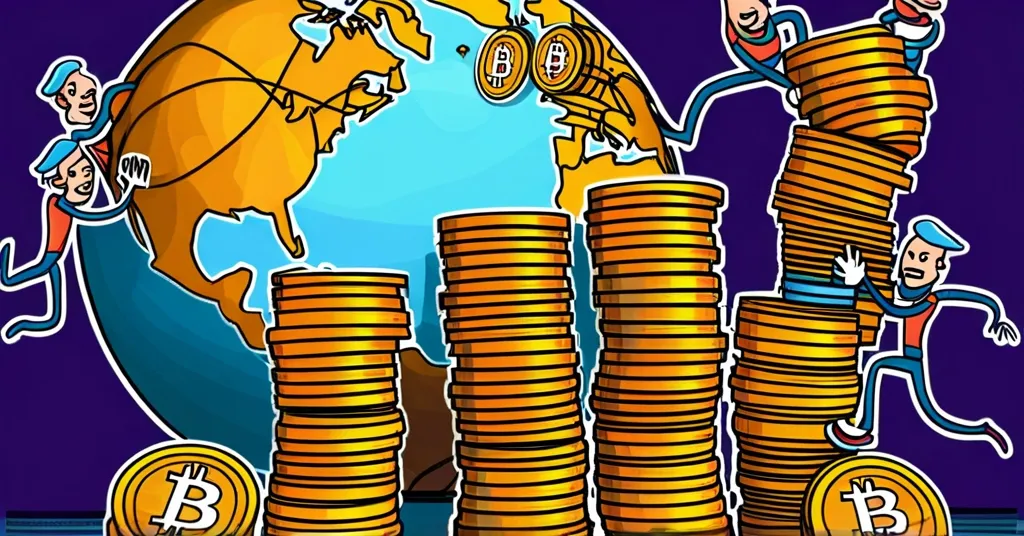Trump’s Bitcoin Reserve Sparks Global Race, Predicts Metaplanet CEO

Trump’s Bitcoin Reserve Plan Could Ignite Global Race, Says Metaplanet CEO
At a New Year’s Eve Bitcoin event in Miami, Simon Gerovich, CEO of Metaplanet, predicted that Donald Trump’s proposed Strategic Bitcoin Reserve in the U.S. could trigger a global race among nations to establish their own Bitcoin reserves. Gerovich, drawing parallels between Metaplanet and MicroStrategy, suggested that this move could have profound implications for global economic strategies, particularly influencing Asian countries like Japan, third-world economies, and even the Middle East.
- Trump’s Strategic Bitcoin Reserve plan
- Japan’s potential response
- Bitcoin’s role in third-world economies
- Middle Eastern governments’ discreet Bitcoin accumulation
Metaplanet, a Japanese investment firm akin to the U.S.-based MicroStrategy, shifted its focus entirely to Bitcoin accumulation in 2024. Gerovich emphasized the company’s strategy, comparing it to forward-thinking entities that recognize Bitcoin’s potential as a strategic asset. He credited the Bitcoin community’s significant role in Trump’s election, stating, “The Bitcoin community helped elect Trump. Now, he’s expected to deliver. If America adopts Bitcoin as a strategic reserve, the rest of the world won’t just watch. They’ll act.”
The proposed U.S. plan involves purchasing 200,000 BTC annually for five years, totaling one million BTC. This move could significantly impact the global perception of Bitcoin as a strategic asset. Gerovich pointed out Japan’s likely response, noting, “Japan looks to the U.S. like a big brother. If Trump moves forward, Japan and other Asian nations will copy the playbook. That’s how this works.” Historically, Japan has often followed U.S. economic policies, and this precedent suggests a potential domino effect in the region.
Beyond the U.S. and Japan, Gerovich sees Bitcoin playing a crucial role in stabilizing economies in third-world countries. “For third-world countries, Bitcoin could stabilize their economies,” he explained. “We’re about to see the full force of competition and strategic decision-making among countries.” This perspective highlights Bitcoin’s potential as a hedge against inflation, offering a new avenue for economic stability in regions with volatile local currencies.
The Middle East is also quietly entering the fray, with Gerovich revealing, “We spoke to officials from the region, and they’re buying Bitcoin under the radar. They just haven’t announced it yet. After Trump declares a Bitcoin reserve, countries will come out and say, ‘Guess what? We’ve got Bitcoin too.'” This suggests a strategic interest in Bitcoin among Middle Eastern governments, aligning with broader global trends.
While the optimism around Bitcoin’s role as a strategic reserve is palpable, the risks are equally significant. Bitcoin’s notorious volatility poses a challenge for any nation considering it as a reserve asset. Additionally, the lack of clear regulatory frameworks and the potential for market manipulation add layers of complexity. Countries like El Salvador, holding approximately 6,000 BTC valued at over $567 million, and Bhutan, with nearly 12,000 BTC valued at over $1.1 billion, are already navigating these waters.
Following Trump’s election win in December 2024, Bitcoin’s price surged over 50% to $108,400, showcasing the cryptocurrency’s sensitivity to political developments. Yet, despite the potential benefits, the path forward is fraught with regulatory challenges and the need for robust systems to manage Bitcoin holdings effectively.
The idea of a Strategic Bitcoin Reserve, where a country holds Bitcoin as part of its financial reserves similar to traditional assets like gold or foreign currency, could reshape global financial strategies. If the U.S. establishes such a reserve, it could pressure other nations, particularly those with strong economic ties like Japan, to adopt similar policies to not be left behind in the global financial race.
However, Bitcoin’s high volatility remains a significant risk, as its value can fluctuate dramatically. The lack of clear regulatory frameworks and the potential for market manipulation are major concerns for governments considering Bitcoin as a reserve asset. Despite these challenges, Bitcoin could help stabilize economies in third-world countries by providing a hedge against inflation and offering a way to store value that is not tied to their often volatile local currencies.
According to Simon Gerovich, Middle Eastern governments are quietly buying Bitcoin, suggesting a strategic interest in the cryptocurrency, though they have not yet made public announcements about their holdings. This aligns with growing crypto activity in the region, particularly in the UAE and Saudi Arabia, as noted in recent reports on cryptocurrency adoption in the Middle East and North Africa.
Looking ahead, a world with multiple countries holding Bitcoin reserves could lead to a new global financial order. The dynamics of competition and strategic decision-making among nations could drive a race to accumulate Bitcoin, potentially reducing its circulating supply and driving up its price. However, the feasibility of such a reserve, especially in the U.S., remains uncertain due to regulatory complexities and the need for Congressional approval.
Key Questions and Takeaways
- What is a Strategic Bitcoin Reserve?
A Strategic Bitcoin Reserve refers to a national policy where a country holds Bitcoin as part of its financial reserves, similar to traditional assets like gold or foreign currency.
- How might Trump’s Bitcoin reserve influence other countries?
If the U.S. establishes a Strategic Bitcoin Reserve, it could pressure other nations, particularly those with strong economic ties like Japan, to adopt similar policies to not be left behind in the global financial race.
- What risks does Bitcoin pose as a national reserve asset?
Bitcoin’s high volatility poses a significant risk, as its value can fluctuate dramatically. Additionally, the lack of clear regulatory frameworks and the potential for market manipulation are major concerns for governments considering Bitcoin as a reserve asset.
- Why might third-world countries benefit from Bitcoin reserves?
Bitcoin could help stabilize economies in third-world countries by providing a hedge against inflation and offering a way to store value that is not tied to their often volatile local currencies.
- How are Middle Eastern governments involved with Bitcoin?
According to Simon Gerovich, Middle Eastern governments are quietly buying Bitcoin, suggesting a strategic interest in the cryptocurrency, though they have not yet made public announcements about their holdings.



